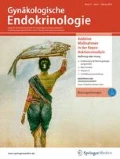Zusammenfassung
Bei der Verordnung von Systemtherapeutika sollte auch bei männlichen Patienten stets das Risiko einer Beeinträchtigung der Zeugungsfähigkeit bedacht werden. Zugleich sollte die Frage nach einem bestehenden und zukünftigen Kinderwunsch aktiv angesprochen werden. Datenbanken, die Auskunft über den Einfluss von Medikamenten auf die männliche Fertilität geben, existieren bis dato nicht, was dem behandelnden Arzt fundierte Recherchen erschwert. Generell sind Daten zu potenziellen Nebenwirkungen auf die männliche Fertilität bei vielen Medikamenten nur spärlich vorhanden, überwiegend gibt es keine Humanstudien. Rückschlüsse werden zumeist aus den tierexperimentellen Toxizitätsstudien innerhalb des Zulassungsverfahrens gezogen. Der behandelnde Arzt ist verpflichtet, über das Risiko der Gonadotoxizität und über die Möglichkeit fertilitätserhaltender Maßnahmen aufzuklären.
Abstract
When prescribing systemic therapies, physicians should always be aware of the risk to impair male fertility. At the same time, the question of existing and future desire for children should be actively addressed. Unfortunately, there are no databases that provide information on the impact of medicines on male fertility; thus, an intense literature review is often required. In general, data of drug-related adverse effects on male reproduction are sparse; most often no human studies have been performed. Conclusions are frequently drawn from animal toxicity studies within the approval procedure. By law, physicians are requested to explain potential gonadotoxic effects to the patients and to discuss fertility-preserving options.
Literatur
Semet M, Paci M, Saias-Magnan J et al (2017) The impact of drugs on male fertility: a review. Andrology 5:640–663
Meistrich ML (2013) Effects of chemotherapy and radiotherapy on spermatogenesis in humans. Fertil Steril 100:1180–1186
Choy JT, Brannigan RE (2013) The determination of reproductive safety in men during and after cancer treatment. Fertil Steril 100:1187–1191
Grunewald S, Paasch U (2015) Drug treatment of dermatological disorders. Aspects to consider from an andrological perspective. Hautarzt 66:913–918
Chang X, Zhou L, Chen X et al (2017) Impact of Imatinib on the fertility of male patients with chronic myelogenous leukaemia in the chronic phase. Target Oncol 12:827–832
Hashemnia SM, Atari-Hajipirloo S, Roshan-Milani S et al (2016) Imatinib alters cell viability but not growth factors levels in TM4 Sertoli cells. Int J Reprod Biomed 14:577–582
Shash E, Bassi S, Cocorocchio E et al (2011) Fatherhood during imatinib. Acta Oncol 50:734–735
Weidner T, Paasch U, Grunewald S (2018) Andrological consultation in new systemic oncological therapies with small molecules. Hautarzt 69:984–990
Ruggeri RM, Campenni A, Giuffrida G et al (2018) Endocrine and metabolic adverse effects of immune checkpoint inhibitors: an overview (what endocrinologists should know). J Endocrinol Invest. https://doi.org/10.1007/s40618-018-0984-z
Kahler KC, Hassel JC, Heinzerling L et al (2016) Management of side effects of immune checkpoint blockade by anti-CTLA‑4 and anti-PD‑1 antibodies in metastatic melanoma. J Dtsch Dermatol Ges 14:662–681
Dillard T, Yedinak CG, Alumkal J et al (2010) Anti-CTLA‑4 antibody therapy associated autoimmune hypophysitis: serious immune related adverse events across a spectrum of cancer subtypes. Pituitary 13:29–38
Albarel F, Gaudy C, Castinetti F et al (2015) Long-term follow-up of ipilimumab-induced hypophysitis, a common adverse event of the anti-CTLA‑4 antibody in melanoma. Eur J Endocrinol 172:195–204
Walter JR, Xu S, Paller AS et al (2016) Oncofertility considerations in adolescents and young adults given a diagnosis of melanoma: Fertility risk of Food and Drug Administration-approved systemic therapies. J Am Acad Dermatol 75:528–534
Fertility preservation for patients with malignant disease. Guideline of the DGGG, DGU and DGRM (S2k-Level, AWMF Registry No.015/082, November 2017). http://www.awmf.org/leitlinien/detail/ll/015-082.html
Grunewald S, Sharma R, Paasch U et al (2009) Impact of caspase activation in human spermatozoa. Microsc Res Tech 72:878–888
Grunewald S, Paasch U, Said TM et al (2005) Caspase activation in human spermatozoa in response to physiological and pathological stimuli. Fertil Steril 83(Suppl 1):1106–1112
Krause W (2008) Drugs compromising male sexual health. Springer, Berlin Heidelberg New York. ISBN 978-3-540-69859‑3
Author information
Authors and Affiliations
Corresponding author
Ethics declarations
Interessenkonflikt
T. Mittank-Weidner, U. Paasch und S. Grunewald geben an, dass kein Interessenkonflikt besteht.
Für diesen Beitrag wurden von den Autoren keine Studien an Menschen oder Tieren durchgeführt. Für die aufgeführten Studien gelten die jeweils dort angegebenen ethischen Richtlinien.
Additional information
Redaktion
H.-C. Schuppe, Gießen
F.-M. Köhn, München
Rights and permissions
About this article
Cite this article
Mittank-Weidner, T., Paasch, U. & Grunewald, S. Zu krank für eine Vaterschaft? Andrologische Beratung bei (neuen) onkologischen Systemtherapien. Gynäkologische Endokrinologie 17, 245–249 (2019). https://doi.org/10.1007/s10304-019-00275-0
Published:
Issue Date:
DOI: https://doi.org/10.1007/s10304-019-00275-0

